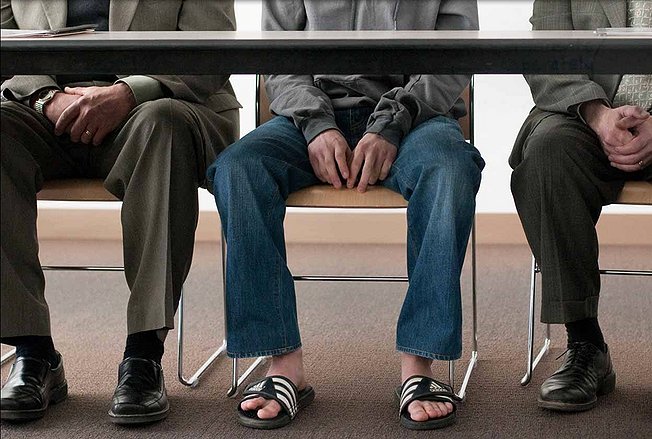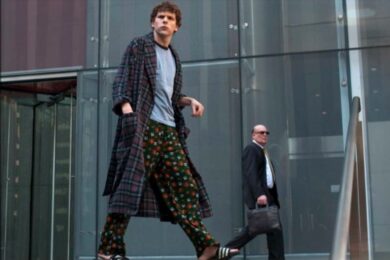Short of baby-kicking and puppy-murdering, there are few introductions that could endear an audience to a character less than The Social Network‘s first peek at Mark Zuckerberg. The boy who would soon be the world’s youngest billionaire is first dumped by his girlfriend after a confusing rapid-fire conversation, involving all kinds of douchebaggery on his part. Then, the heartbroken programmer proceeds to get hammered, spout slander against his ex online and in one inebriated evening, creates a girl-rating website that crashes Harvard’s servers, making him the most hated man on campus. This site was facemash, the first incarnation of what would become facebook and the first step in Zuckerberg’s ascent (or descent).
The choice of script is a departure from director David Fincher’s usual, visually-focused work (Fight Club, Se7en, and The Curious Case of Benjamin Button). But he somehow manages to make stunning pictures of people talking in rooms about code, intellectual property, and advertising. The film is also scored with subtle, but dramatic flourishes from the surprising source of Nine Inch Nails’ Trent Reznor.
The story follows the inception of facebook through witness testimony given at the tribunals of two lawsuits disputing said inception – both with Zuckerberg (played by Jesse Eisenberg) as defendant. This cleverly allows Fincher liberties with the truth via a number of dodgy narrators. The story is told, but not from all sides simultaneously, leaving most motives and mysteries unsolved – a director’s gift from spitting-quick-wit screenplay scribe Aaron Sorkin (of A Few Good Men and The West Wing fame).
It’s obvious that the founding fathers of facebook have been caricatured, with their respective faults exaggerated to varying degrees, and there are many scenes and characters that were obviously created for the purpose of plot devising (one of which is an observing legal assistant that serves as Zuckerberg’s final voice of reason and whose name is Marilyn Dopey – a name that could have possibly been inspired by an interview Trent Reznor did with Mojo magazine last year where he stated that Marilyn Manson was "a dopey clown"… but then again, I may be reading too much into it…).
However, one thing that the caricatures offer, in Zuckerberg’s case, is consistency. Although he begins as a slightly rude, dismissive student sitting before an angry tribunal in Velcro Adidas deck sandals, he only ends up a slightly rude, dismissive billionaire before an angry tribunal in Velcro Adidas deck sandals. He is ever unlikable, ever untrustworthy and petty, but does draw a pinch of sympathy in being that guy (we all know one), that brilliant, borderline genius without a clue. If Zuckerberg is truly anything like Eisenberg’s version, then an argument for Asperger’s syndrome stands on firm footing.

CFO and initial funder of facebook, Eduardo Saverin (played by soon-to-be Spidey and already BAFTA-decorated Andrew Garfield), however, is portrayed quite differently. He comes off as understanding, infinitely patient, generous – the friend that Zuckerberg never deserved. I would imagine this depiction should be up for some degree of debate seeing as Saverin himself was the only person involved in facebook’s creation to consult with Ben Mezrich on The Accidental Millionaires (the book on which the film is based). It’s a bit suspicious that he is the single likeable character – a fact which flies in the face of Sorkin’s claim that his story is told through a series of "unreliable narrators". Many are sure to lament ‘Et tu, Mark?’ on his behalf.
On that note, the disputed truth of the facebook story is RAM full of absolutely un-writable characters. After all, if you were to conjure a pair of opponents for Zuckerberg upon the battlefield of intellectual property, would you have chosen identical twin Olympic rowers christened with the inimitable moniker of Winklevoss? I wouldn’t imagine so. These two (both played by Armie Hammer and who Zuckerberg cleverly refers to as ‘the Winklevi’), along with their business partner Divya Narendra (Max Mighella), are particularly well formed in the story. They begin as quite relatable in their plight – the wronged innovators of a new idea – but end up arrogant pricks, discussing the possibility of having ‘the nerd’ – Zuckerberg – whacked (a top moment in the film comes here when one of the twins negates the need to hire someone for the job: "I’m 6’4, 220 pounds and there are two of me").
A slightly less believable character is found in Justin Timberlake’s Sean Parker who is the undeniable villain/evil mastermind of the film. Parker himself is by many accounts a rare breed of genius-rock-star-programmer and a notoriously unreliable party animal, but is by very few, if any, accounts the vindictive, conniving sonofabitch that comes across in Fincher’s telling. Garfield and Timberlake’s respective characters serve as the good and evil perched upon naive Zuckerberg’s sloping, slouched shoulders, and are used by Fincher to fantastic, classic Hollywood effect: ‘come to the dark side’ says Parker, ‘we have coke, supermodels and coolness running out our ears’. Timberlake makes phenomenally despicable work of the Napster founder, and as such I recommend he consider picking up a shift or two as Iago on the stage.
The film raises a number of valid points about this contemporary Age of The Social Network, not the least of these being that, with the speed at which technology moves, millionaires of technology will be made younger and younger (ex. Daniel Ek, 27, CEO and founder of Spotify; Andrew Mason, 29, creator of Groupon; Andrey Ternovskiy, 18, inventor of Chatroulette) and therefore possibly uneducated in the emotions and ‘golden rules’ of the hard-working, moral adult’s ‘real world’. After watching this film, there is a certain discordance that every facebook user should feel in realising that this man – the immature college kid who created a misogynistic ‘hotness’ rating site, partially stole a lucrative idea, and most of all betrayed his best friend – is the man to whom hundreds of millions of people have given up intimate personal details and opened up direct windows into their private lives. The fact that, in actuality, few people will be shaken by this epiphany is in itself a sign of the times.
As the advertising campaign for the film suggests, the creator of the world’s greatest tool for making and maintaining friendships is unable to add a true one to his name. Such an ending might not sit well with some, as his actions may lead champions of justice (or perhaps lovers of schadenfreude) to think Zuckerberg deserved worse than a mere dent in his vast fortune. But as any biographer knows, the most you can do to bring down a rich man is to show he is lonely. Fincher takes the well trodden money-can’t-buy-happiness route, set to The Beatles, and somehow it wouldn’t feel right any other way.



